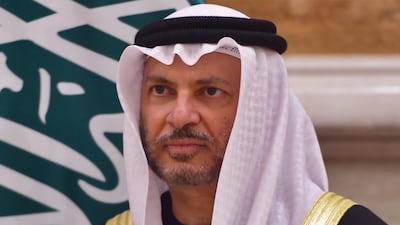Minister of State for Foreign Affairs Dr Anwar Gargash said on Saturday that Houthi rebels in Yemen are looting up to $5 billion (Dh18.4bn) from the state to support their terrorist militias.
"The Houthi, with his grip on power in Sanaa, is holding on to control of the country's income, which is estimated at between $3.5bn and $5bn a year, money that is spent on his supporters only and on supporting terrorist militias," said Dr Gargash on Twitter.
“Studies show that despite the war, the importation of vehicles into Houthi-controlled areas and the building of residences for their supporters are witnessing a major boom, no doubt from finances from the looted state treasury.”
Dr Gargash said the “the manifestations of major looting” will soon become clear as the “cover” has been lifted, in reference to Houthis’ former alliance with forces loyal to ex-president Ali Abdullah Saleh. He was killed by the Iran-backed rebels earlier this month and his party members in the General People's Congress part are being targeted.
“With the ongoing liquidation of the General People’s Congress and its members in regions controlled by the Houthis, the manifestations of major looting from the state will become clear, and the cover of the previous partnership has been lifted, and the cost of the terrorist militia coup will be revealed,” Dr Gargash said.
On Friday, the United Nations special envoy to Yemen said that the Houthis' behaviour is unacceptable, adding that he had met with Dr Gargash and other UAE officials to discuss the situation.
“What is happening in Sanaa is unacceptable and against humanitarian international law. We need to put an end to the targeting of GPC [General People’s Congress] leaders, activists and their families,” said Dr Ismail Ahmed on Twitter.
He said that he held “productive and constructive” meetings with UAE officials, with whom he discussed “the best way to advance a political solution”.
A Saudi-led coalition, which includes the UAE, is fighting in Yemen on behalf of the internationally-recognised government against the Houthi forces, which control Sanaa and much of the impoverished country. Three years of war have killed more than 10,000 people and taken the country to the brink of famine.
UAE's humanitarian assistance
In an effort to alleviate suffering, the UAE continues to provide relief and development assistance, which has reached more than $2bn. The Emirates Red Crescent has also treated many wounded Yemenis and dispatched several medical convoys in support.
Twenty-three Yemenis returned to their home country on Saturday as part of the UAE's humanitarian assistance. They were flown to India eight months ago for treatment paid for by the ERC.
The National was at the scene in Aden International Airport, where emotions were running high as Yemenis expressed their gratitude towards the UAE leadership.
“We cannot describe our feelings towards the UAE, its leaders and its people,” said Yemeni Abdulmalik Mansoor. “Our words will not be enough to show our appreciation to our second homeland, the UAE, because they put smiles back on our faces.”
Mr Masoor was shot in the leg during fighting for Bab Al Mandeb on the west coast. He was sent to India for surgery after the condition of his leg worsened despite treatment in Aden.
For Nasser Anis, going back to Yemen and being able to walk again was nothing short of a miracle. The fighter from Lahj was also wounded in fighting on the west coast and unable to walk after being hit in the leg and back by mortar fragments.
"I feel like I was born again, and today is a very special day for me," he said. "When I got on a plane months ago, I was on a stretcher unable to move.
“Today, I am back at the same airport, but — thank God — I am standing on my feet, and the UAE is behind the joy I feel.”
Mr Anis said he and his countrymen received excellent medical treatment and psychological support, adding that he would do anything to protect "the country of charity and giving, the UAE".
Read more: Yemeni forces retake last rebel outpost in Shabwa province
Dr Ishraq Al Subaei, assistant undersecretary of the ministry of public health and population, said that this was the fifth group of Yemenis whose treatment in India was paid for by the UAE.
“This is not strange at all that the UAE would pay for this. It shares our suffering, and it works hard to alleviate the harsh consequences of war,” she said.
The UAE has sent hundreds of Yemenis to receive medical treatment in Jordan, India and Sudan.

